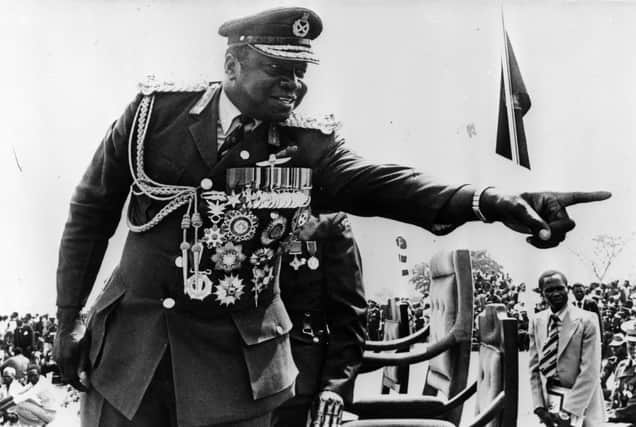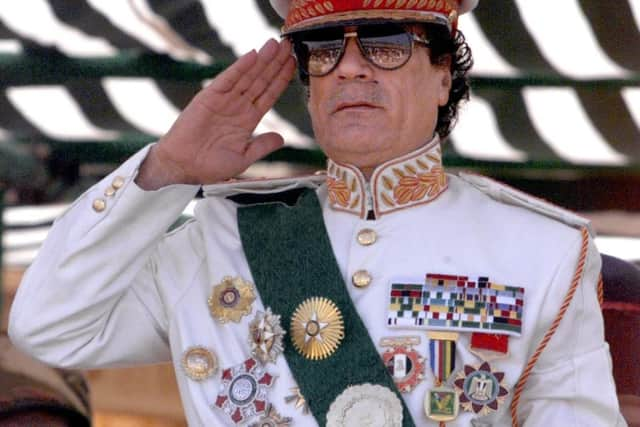As Tory leadership contenders burnish their military credentials, will a new Winston Churchill emerge or just a little generalissimo? – Alastair Stewart


In the 20th century, the garish rank of ‘generalissimo’ came to be associated with officers who took dictatorial power in their countries.
Usually, it was reserved for a senior officer who became the head of state or head of government like Chiang Kai-Shek in China and Francisco Franco in Spain. Western diplomats referred to Joseph Stalin as one, usually facetiously.
Advertisement
Hide AdAdvertisement
Hide AdAnd as the Conservative leadership contest intensifies, there is a clear emphasis on military experience as a credential for becoming Prime Minister. Whether that be candidates who have served or increased defence spending, military know-how is now a top prerequisite. It is usually accompanied by a fluttering flag and a gaudy dose of patriotism.
It's a curious thing, the need to justify power by service and military experience. This point is brilliantly satirised in Robert A Heinlein's 1959 novel Starship Troopers. Only someone who has served can participate fully in the democratic process. The Spartan training process known as the agoge was essential for full citizenship.
However, in Britain, proving one's military credentials in service has never been a must-have vote winner for a Prime Minister. The Westminster government may be an "elective dictatorship", but we have never sought a generalissimo. Our national life and monarchy are replete with the trappings of imperialism, rank and martial emblems without the need to serve.
Jim Callaghan was the last Prime Minister with any military experience, like Ted Heath before him (Harold Wilson volunteered for military service but was classed as a specialist and moved into the civil service instead).


Britain has had only two Prime Ministers who have been military generals: Lord Shelburne (1782–83), who was promoted from Lieutenant-General to full General in the British Army, and the Duke of Wellington, who achieved the supreme rank of Field Marshal in 1813 and served as prime minister twice (1828-1830, and briefly for a month in 1834).
In the United States, some have lied about or excused their lack of service in the armed forces. It is likely tied to the country's revolutionary origin and the US Constitution's description of the president as "Commander-in-Chief". George Washington was promoted posthumously to General of the Armies of the United States in 1976, literally making him a generalissimo.
Perceived military pretentiousness often finds comedy in the Russian and North Korean servicemen who stand clad in medals from head to toe. In 2019, the Russian military finally issued a new regulation: no more than ten medals can be worn on parade uniforms.
So why has post-war Britain never felt the need to determine and judge our premiers by our martial past? Four British Prime Ministers saw active service in the Great War: Winston Churchill, Clement Attlee, Anthony Eden and Harold Macmillan.
Advertisement
Hide AdAdvertisement
Hide AdThe publication of Viscount Alanbrooke's unabridged diaries in 2001 caused quite the storm. He was Churchill's Chief of the Imperial General Staff, and he kept a diary throughout the Second World War. His memoirs are a candid and insightful examination of the war's conduct.
And the man Alanbrooke paints in exacting detail is the same man some Conservative contenders today would model themselves on.
Churchill appointed himself Minister of Defence in 1940, in conjunction with his role as Prime Minister. This dual role enabled him to work directly with his military commanders to prevent another disaster like Gallipoli in 1915. He was a warlord.
There are many pictures, statues and busts of Churchill in military regalia and uniforms. He liked it, but he had also earned it. He joined the Fourth Queen's Own Hussars in 1895 and took part in skirmishes in Cuba.
He was a Lieutenant Colonel in the trenches and commander of the 6th Battalion of the Royal Scots Fusiliers. He served in the Indian northwest frontier and the Sudan, where he saw action in the Battle of Omdurman in 1898. He was captured as a prisoner of war in South Africa in 1899.
Churchill believed he had an appointment with destiny. But, according to Alanbrooke, he was bold, brash and while “three-quarters of the population of the world imagine that Churchill is one of the Strategists of History, a second Marlborough… the other one-quarter have no idea what a public menace he is and has been throughout this war!”
"Without him England was lost for a certainty,” he added, "with him England has been on the verge of disaster time and again."
Political oversight, political direction, military expertise, advice, and personal clashes made Alanbrooke's diaries a celebrated resource to find the real Churchill.
Advertisement
Hide AdAdvertisement
Hide AdChurchill was informed by his self-belief, his knowledge, his government experience and the horrors of the First World War. He was no bloodthirsty terror who thought his military talents better than they were.
For every bad idea, including the snatching of Greek islands and liberating Norway, there were moments of genius. Both Churchill and Alanbrooke resisted US calls for a second front and early invasion of Europe, remembering the slaughter of the First World War.
Churchill never overruled the Chiefs of Staff on a significant strategic decision in all the long years of war. Politicians should trust their military leaders, and military commanders their civilian oversight. Churchill was self-aware of his own bombast and shortcomings.
And Alanbrooke, in the closing days of the war, gave a more rounded estimation: “I thank God that I was given an opportunity of working alongside of such a man, and of having my eyes opened to the fact that occasionally such supermen exist on this Earth.”
So for every Conservative candidate who is playing the military card, the question is, do they have the mettle to be like Churchill, or are they Brexit bluffers, little generalissimos, faking it while standing atop affected strength and faux power?
Comments
Want to join the conversation? Please or to comment on this article.
